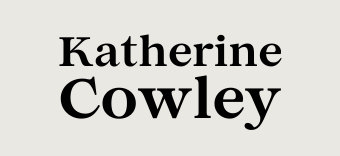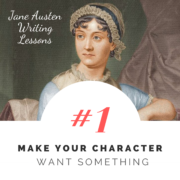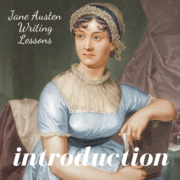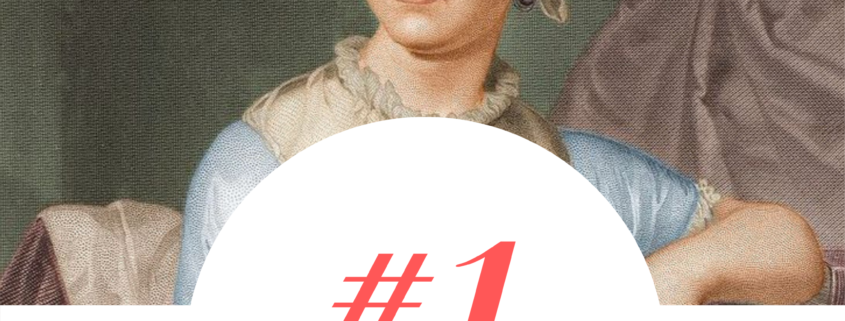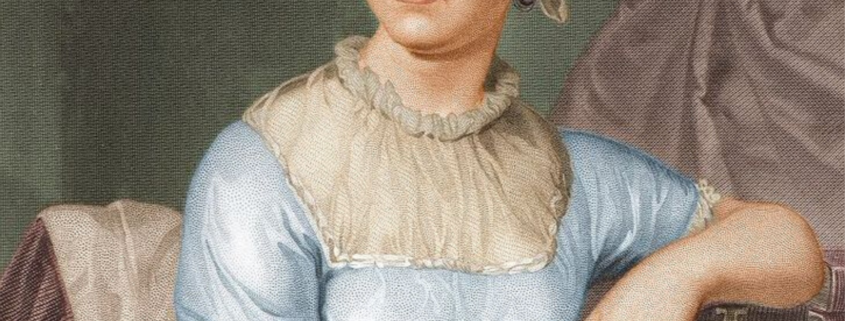Full Sized Blog Element (Big Preview Pic)
#1: Make Your Character Want Something
/0 Comments/in Jane Austen Writing Lessons/by Katherine Cowley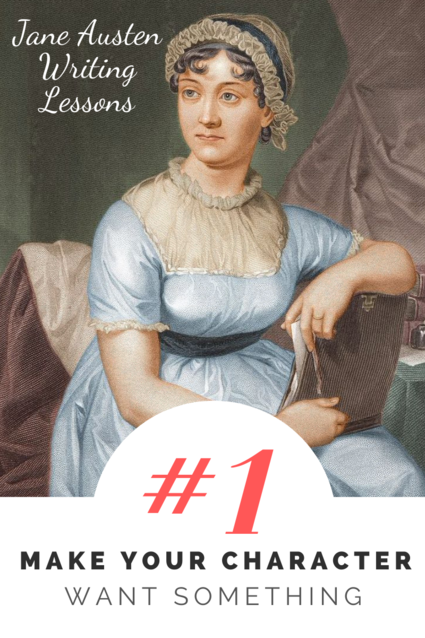
The key components of story: plot character
At the heart of any story are two fundamental components: character and plot. There is a lot of debate about whether character or plot is more important, and both need to be addressed at every stage of the writing process. Yet there is an underlying principle that distills both character and plot.
Your main character needs to want something.
In Jane Austen’s novel Emma, the main character, Emma Woodhouse, wants to bring others happiness (and herself entertainment) by playing matchmaker. At the beginning of the book she sets herself on this path while speaking of her success in matching her dear friend and governess, Miss Taylor, to Mr. Weston:
“I made the match myself. I made the match, you know, four years ago; and to have it take place, and be proved in the right, when so many people said Mr. Weston would never marry again, may comfort me for any thing.”
Mr. Knightley shook his head at her. Her father fondly replied, “Ah! my dear, I wish you would not make matches and foretell things, for whatever you say always comes to pass. Pray do not make any more matches.”
“I promise you to make none for myself, papa; but I must, indeed, for other people. It is the greatest amusement in the world! And after such success you know!”
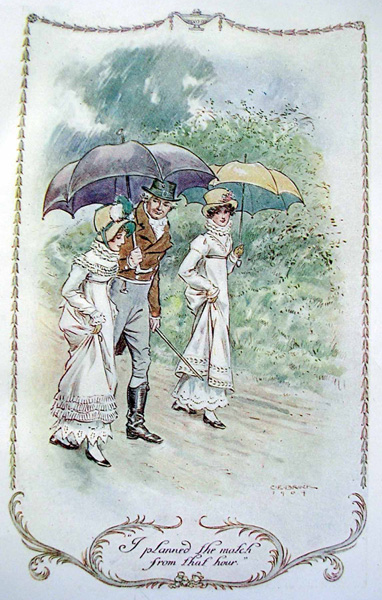
Illustration by C.E. Brock, from a 1909 edition of Emma
The wants of a character reveal their internal character and personality.
Emma believes she can be a matchmaker because she believes she understands people better than they understand themselves. Not only does she find herself superior to others, but she is used to getting what she wants.
The wants of a character create plot.
Emma’s desire to make matches leads to most of the action (and comedy) of the novel, such as her prolonged attempt to set her friend Harriet Smith up with the vicar, Mr. Elton.
Whether you’re brainstorming or revising a story, make sure your main character wants something, and that this want is manifest throughout the narrative.
How do you show character wants and motivations?
One of the most powerful ways to show what a character wants is through their dialogue, as seen in the example from Emma. Dialogue is not just about communication: it is a tool we use to assert our identities in the world, to create change, and to influence other characters.
What a character wants should also be shown through action. Emma arranges endless opportunities for Harriet and Mr. Elton to spend time together. At one point she is on a walk with them and she intentionally breaks her shoelace so she can fall behind, giving them the opportunity to be alone.
A further method that can be used to show character wants and motivation is through description. Emma notices every time Mr. Elton looks in Harriet’s direction, and the description reflects her motivation and hopes.

Exercise 1: Think of one of your favorite books or movies. What does the main character really want? Share your response in the comments.
Exercise 2: Whether you’re writing a novel, a short story, or a picture book, your main character should want something. Write a manifesto from their point of view about what they want, why they want it, and what they are willing to do to get it. This could be a single paragraph or a full page.
Exercise 3: Rewrite the following short scene about a woman named Mariah. The catch: you must add a strong character want. This could be any want, in any genre. For example:
- To be a matchmaker
- To find a valuable clue that will help her stop an assassin
- To be on time to something in her life, for once
Whether you choose one of these sample wants or your own, the character’s want should have an impact on the dialogue, the action, and the description.
Mariah walked up to the ticket counter. “One ticket for Ocean’s 8. The 7:00.”
The man at the counter nodded, not even looking up at her. As he made the selections on his computer, her eyes fell on his name tag. “Markus.” Her eyes moved back up to his face, and this time, she looked past the glasses and the beard. It really was Markus. She hadn’t seen him in years, not since high school graduation.
“Markus Santos?”
At this, he looked up from the screen. It took a moment, but realization dawned on his face. “Mariah. How are you?”
“Pretty good. How about you?”
“Great,” he said, but not very convincingly. “That’ll be $10.25.”
She inserted her credit card.
“Are you seeing this by yourself?” he asked.
“No, I’m meeting friends. They already have their tickets.”
She removed her credit card and he handed her the ticket.
“Have a nice night,” he said with a nod. There was no trace of the smiles he used to give to everyone.
“You too,” she said. She entered the theater.
Introduction to Jane Austen Writing Lessons
/0 Comments/in Jane Austen Writing Lessons/by Katherine Cowley
It is a truth universally acknowledged that if you wish to write well, you should learn from the very best writers.
In other words, you should read Jane Austen.
I do not find this to be a great sacrifice.
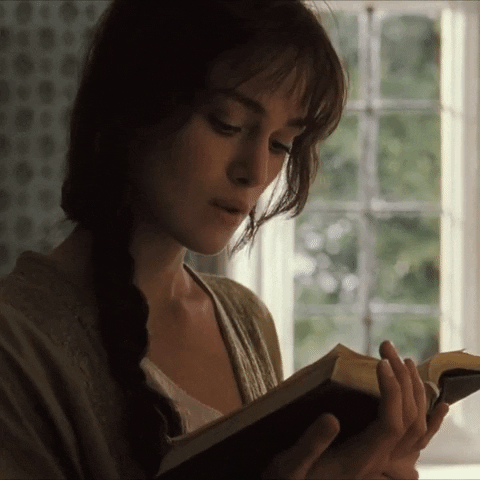
Elizabeth Bennet in the 2005 film adaptation of Pride and Prejudice
Jane Austen Writing Lessons
I am a writing teacher by profession and a long-time Janeite. Jane Austen Writing Lessons is my attempt to combine these two interests by creating a series of writing lessons based on the books of Jane Austen.
What will these lessons look like?
Each writing lesson will focus on a principle of creative writing. I will address how to use this principle, examine how Jane Austen uses the principle in one of her works, and then provide writing exercises that apply the principle. While the examples draw from the writings of Jane Austen and other Austen-inspired works, the principles can be applied to writing in any genre, and the writing exercises provide the opportunity to apply these principles in a variety of ways.
The first ten lessons address big picture principles for writing. After that, sets of lessons will go into depth on specific topics, like dialogue.
The Benefits of Writing Exercises
Musicians practice scales to teach their fingers to move in certain patterns. The coach of a sports team runs drills to prepare the players for different things that might happen on the field or on the court.
Writing exercises fulfill the same purpose: they are a chance to exercise or practice a principle in order to internalize it and be prepared to use it appropriately in your writing.
In my years of teaching writing, I have found that learning about a principle is rarely enough. Writers learn the principles best when they practice them, and writing exercises are an easy, contained way to do this.
Who Am I?
I have an MA in Rhetoric and Composition and focused my studies on the teaching of writing. I have taught writing classes at Mesa Community College and Brigham Young University, and I currently teach writing at Western Michigan University.
My debut novel, The Secret Life of Miss Mary Bennet, will be released in April 2021 by Tule Publishing. I also have over a dozen published short stories and novellas.
Visit the Jane Austen Writing Lessons homepage to view all of the writing lessons index.
